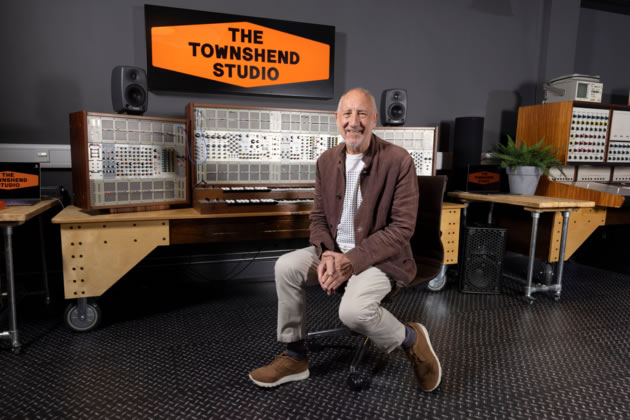Pete Townshend Unveils Studio at the University of West London
Will house the synthesiser collection of The Who guitarist

Pete Townshend with his iconic synths. Picture: UWL
October 11, 2024
This week has seen the launch of a new teaching and creative installation at the University of West London (UWL), featuring iconic synthesisers and instruments provided by British rock legend and UWL Alumnus Pete Townshend
The Townshend Studio was unveiled on Thursday 10 October, and is part of UWL’s London College of Music at the University’s Ealing campus. The new studio arose from Chiswick-born Pete Townshend looking for a home for his synthesisers to leave a legacy for the next generation.
The collection includes some of the most influential instruments in the development of electronic music. It comprises 12 principal synthesisers including the ARP Model 2500 (1970), used on Quadrophenia, and the rare and sought-after Yamaha GX-1 (1975), one of only 10 made with a retail price of over 60,000 USD on release, plus many other instruments played by Townshend throughout his career.
The studio was officially launched at an event attended by over 300 guests who heard the British rock legend reflect on his life, music career and his pioneering use of technology in the creative process. Journalist and author, Will Hodgkinson, interviewed Pete Townshend about his transformational time at the Ealing School of Art, the lifelong impact of his art teacher, Roy Ascott, the role technology and synthesisers played in his music and why he hopes The Townshend Studio will inspire a new generation of musical creatives. The evening was introduced by Sarah Raybould, Deputy Vice-Chancellor and former Director of London College of Music.
Pete Townshend said, “It’s my hope that the studio will be a creative space for learning, collaboration, experimentation and play, inspired by the musical and artistic legacy of Ealing, an area integral to the development of British music in the 1960s,”
Like many other musicians of his generation, including fellow UWL alumni, Queen’s Freddie Mercury and the Rolling Stones’ Ronnie Wood, Townshend attended art school. During his time at the Ealing School of Art, now part of the University of West London, Townshend studied under radical teacher, artist, and pioneer of new media, Roy Ascott, who led the ‘Groundcourse’ at the School in the 1960s.
The programme encouraged students to re-think their relationship to their work, audiences, and environment, with Ascott instructing students to “...stop thinking about artworks as objects, and start thinking about them as triggers for experiences.”
Townshend describes his time there as “a revelation” and has credited Ascott’s teaching with informing his vision for The Who. He says “I was at an art school where the course was dedicated to breaking the rules and I just drafted that into my work as a guitar player.”
Townshend’s experience on the graphic design course also gave him the tools to develop an identity for the iconic band: “I came up with target t-shirts, Union Jack jackets, the arrow over the ‘O’ in the name The Who... it taught me about presentation and the importance of the client, or in my case, the audience.”
Pete Townshend has worked closely with the University’s academic and technical staff to design and build the studio, which aims to enable students, artists and researchers to fully explore the cybernetics-inspired vision of Roy Ascott through the connection of hardware, software, people and space.
“This is a unique resource for students and the wider public, uniting legacy and contemporary technologies. The studio will explore the potential for creative practice to inform and inspire beyond the arts and into the fields of science, technology, health, humanities and social science. Crucially, it will be an ideas hub for creative connections and collaborations locally, nationally and worldwide,” said Vice-Chancellor of UWL Professor, Peter John CBE.
Like Reading Articles Like This? Help Us Produce More This site remains committed to providing local community news and public interest journalism. Articles such as the one above are integral to what we do. We aim to feature as much as possible on local societies, charities based in the area, fundraising efforts by residents, community-based initiatives and even helping people find missing pets. We’ve always done that and won’t be changing, in fact we’d like to do more. However, the readership that these stories generates is often below that needed to cover the cost of producing them. Our financial resources are limited and the local media environment is intensely competitive so there is a constraint on what we can do. We are therefore asking our readers to consider offering financial support to these efforts. Any money given will help support community and public interest news and the expansion of our coverage in this area. A suggested monthly payment is £8 but we would be grateful for any amount for instance if you think this site offers the equivalent value of a subscription to a daily printed newspaper you may wish to consider £20 per month. If neither of these amounts is suitable for you then contact info@neighbournet.com and we can set up an alternative. All payments are made through a secure web site. One-off donations are also appreciated. Choose The Amount You Wish To Contribute. If you do support us in this way we’d be interested to hear what kind of articles you would like to see more of on the site – send your suggestions to the editor. For businesses we offer the chance to be a corporate sponsor of community content on the site. For £30 plus VAT per month you will be the designated sponsor of at least one article a month with your logo appearing if supplied. If there is a specific community group or initiative you’d like to support we can make sure your sponsorship is featured on related content for a one off payment of £50 plus VAT. All payments are made through a secure web site. |